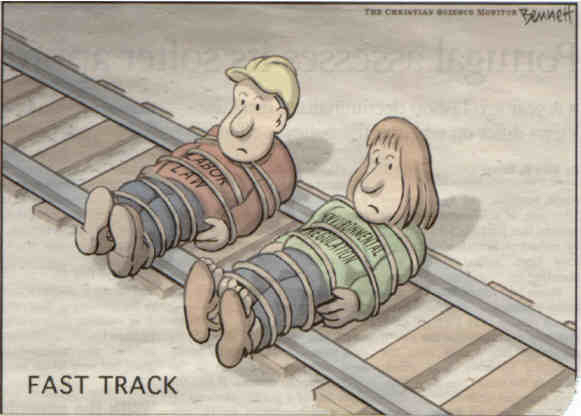Fast Track is the wrong path to ending inequality

President Bush wants “Fast Track,” a dangerous proposition for democracy and for the world economy. Fast Track is shorthand for granting the President the authority to eliminate many key democratic processes used to create legislation, such as full committee hearings, full debate and the ability to amend legislation.
The White House wants to speed through highly controversial agreements, such as the proposed Free Trade Area of the Americas (FTAA), which would extend NAFTA to the rest of the Americas, and new agreements at the World Trade Organization (WTO).
The Bush administration claims that Fast Track will “counter terrorism with trade.”
But evidence shows that economic globalization — such as that embodied in the FTAA and WTO — is more a cause of global poverty and inequality than a solution.
Last year, the CIA predicted in its “Global Trends 2015” report that, “The rising tide of the global economy will create many economic winners, but it will not lift all boats. … (It will) spawn conflicts at home and abroad, ensuring an even wider gap between regional winners and losers than exists today. … (It) will foster political, ethnic, ideological and religious extremism, along with the violence that often accompanies it.”
The CIA is not alone in its assessment.
The World Bank also reported in 1999 that “globalization appears to increase poverty and inequality. … The costs of adjusting to greater openness are borne exclusively by the poor, regardless of how long the adjustment takes.”
The United Nations echoes these words in its 1999 Human Development Report. “The new rules of globalization — and the players writing them — focus on integrating global markets, neglecting the needs of people that markets cannot meet. The process is concentrating power and marginalizing the poor, both countries and people.”
The policies of economic globalization — including free trade, financial liberalization, deregulation, reduced government spending and privatization — concentrate wealth at the top. They remove from governments and communities the very tools needed to ensure equity and to protect workers, social services, the environment and sustainable livelihoods.
Economic globalization and its institutions have created a dramatic increase in global inequality — both within and between nations.
In the United States, as with much of the world, trade has doubled since the early 1970s. In the United States, the median earnings of workers more than doubled from 1947 and 1973, but since 1973, median earnings have fallen by almost 15 percent, with the earnings for the poorest 20 percent of households falling the furthest behind, according to the U.S. Census Bureau. More than 40 percent of all earning gains have gone to the richest 1 percent.
What’s more, trade is directly responsible for at least 15 percent to 25 percent of this growth in wage inequality, according to the U.S. Trade Deficit Review Commission, a congressional organization that studies the impact of the trade deficit on the U.S. economy. In fact, the only segment of the U.S. population that has experienced large wealth gains since 1983 is the richest 20 percent of households.
Globally, the income gap between the fifth of the world’s people living in the richest countries and the fifth living in the poorest doubled from 1960 to 1990. The gap increased from a 30-1 ratio to 60-1. By 1998, it had jumped again. The gap widened to an astonishing 78-1, according to the U.N. Human Development Report.
Poverty trends have worsened as well. There are 100 million more poor people in developing countries today than there were a decade ago, according to the U.N. Human Development Report, though economic globalization has increased during this period.
Free trade is not the solution the world is looking for. And Fast Track would make matters worse.
